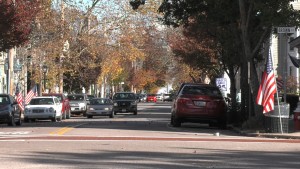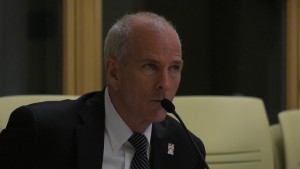 Wickford is one of the prettiest villages in Rhode Island, in part because it’s on the water. Because of that proximity, virtually everyone agrees the village needs sewers in a town where the vast majority of property owners still rely on septic systems.
Wickford is one of the prettiest villages in Rhode Island, in part because it’s on the water. Because of that proximity, virtually everyone agrees the village needs sewers in a town where the vast majority of property owners still rely on septic systems.
But how to pay for sewers has been a challenge as town officials put together financing for the estimated $5 million cost. Sewer installation for the commercial buildings in the village will be the third phase of a larger sewer project that began on Post Road near Route 403 several years ago.
North Kingstown hoped a private developer’s proposal for mixed use development of a former elementary school would help extend a sewer line running down Post Road that currently ends at the state police barracks. When the developer’s project stalled, the town manager and town planner at the time in 2014 came up with another idea: Running the line east onto Intrepid Drive, down the backside of Wilson Park and across the park over to Wickford, right by an affordable housing complex.
 “The plan was to get the sewers to Wickford because Wickford needed them forever,” said Jim McGuire, a longtime resident and chairman of the town’s GOP committee, who has kept a close eye on the sewer project. When the town proposed using federal Community Development Block Grant money — CDBG for short — to help pay for the sewers it raised red flags. The CDBG money comes from the Department of Housing and Urban Development. McGuire says it also comes with heavy strings attached under guidelines revised last year. They are referred to as Affirmatively Furthering Fair Housing or AFFH for short.
“The plan was to get the sewers to Wickford because Wickford needed them forever,” said Jim McGuire, a longtime resident and chairman of the town’s GOP committee, who has kept a close eye on the sewer project. When the town proposed using federal Community Development Block Grant money — CDBG for short — to help pay for the sewers it raised red flags. The CDBG money comes from the Department of Housing and Urban Development. McGuire says it also comes with heavy strings attached under guidelines revised last year. They are referred to as Affirmatively Furthering Fair Housing or AFFH for short.
The town plans to use nearly $1.5 million in what is labeled ‘CDBG Disaster Recovery’ funds to pay for sewers at two affordable housing projects along and at the end of Intrepid Drive. The disaster? Hurricane Sandy in 2012. The rationale: the affordable housing projects are in a flood zone and need sewers.
McGuire says the benefit of the federal funds may not be worth the cost to the rest of the town in the long run.
“Once you get signed up to HUD’s CDBG money, once you take the first grant under the new rules, you are signed up. You are committed to every rule … and it is a god-awful, long set of rules, very bureaucratic, very heavy, very expensive.’’
McGuire and others led the fight last year against a controversial local plan called Rhode Map. Critics say if any community takes HUD money, then low-income rental housing would need to be built in existing neighborhoods throughout Rhode Island and across the country. Opponents call it social engineering.
Another potential problem: The affordable housing units come with deed restrictions, meaning they have to be used for low-income residents for a set period of time — usually 30 years, sometimes up to 99 years. After those restrictions expire, the property can be sold to private companies. And the two in North Kingstown are both a stone’s throw from the water, making them attractive for investors.
That means taxpayers could wind up funding a sewer line that ultimately benefits a private owner.
“Essentially we’re investing money as citizens that will go to the benefit of the new owners once it’s flipped,” McGuire said. “Low income housing is not an excuse to help get sewage into the rest of the town benefit. And in fact, it would help get the rest of the town, Wickford, a benefit. That is sorely needed, but it is not supposed to be used for that. There are laws against it. Federal laws.”
So what does the town have to say? The town manager at the time, Mike Embury, and town planner John Reiner, are both gone. When we asked the current planner what the deed restriction is on Wickford Village, originally built as Navy housing in the mid-60s, she said she didn’t know and referred us to the property owner, who did not return our calls. The planner did tell us the newer North Cove, completed in 2013, has a 50-year deed restriction.
 McGuire said Town Council President Kerry McKay, a fellow Republican who voted in 2014 to use the HUD money for the sewer installation to Wickford, has brushed off his concerns.
McGuire said Town Council President Kerry McKay, a fellow Republican who voted in 2014 to use the HUD money for the sewer installation to Wickford, has brushed off his concerns.
McKay was reelected in November, but the Republicans lost their majority, meaning he will likely be out as council president when the new council takes over. He did not respond to our requests for a comment.
The project is behind schedule, so while the CDBG money has been approved and set aside, it still has not been spent. And a new town council will be taking over soon.
McGuire said the town should drop the plan to use federal money and find it somewhere else in a $100 million annual budget.
“Free money is never free. There’s always a price to pay. You don’t know what it will be, but there will be a price to pay.”
The Hummel Report is a 501 3C non-profit organization that relies, in part, on your donations. If you have a story idea or want make a donation go to www.HummelReport.org, where you can also see the video version of this story. You can mail Jim directly at Jim@HummelReport.org.

